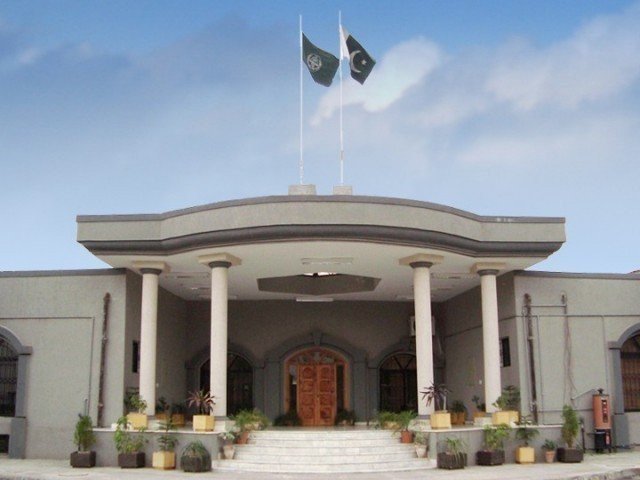
The Islamabad High Court (IHC) on Monday accepted Pakistan Tehreek-e-Insaf (PTI) Chairman Imran Khan’s appeal against the cancellation of his bails by lower courts in nine cases, directing the trial courts to hold proceedings on his applications afresh.
A division bench, headed by IHC Chief Justice Aamer Farooq and comprising Justice Tariq Mehmood Jahangiri, heard the appeal.
The bench reinstated Imran’s bails and set aside different trial courts’ decisions of cancelling the bails.
Imran’s bails were cancelled in three cases in connection with the May 9 riots, three concerning protests in Islamabad, besides the Toshakhana (gift repository) case, violation of Section 144 and attempt to murder case.
Six of the bail pleas were before different district and session courts and three before the anti-terrorism courts.
Earlier in the day, another IHC bench comprising Chief Justice Aamer Farooq reserved its ruling on a plea from the Federal Investigation Agency (FIA) for holding in-camera proceedings of Imran’s bail application in the cipher case.
In its plea, FIA prosecutor Shah Khawar cited diplomatic concerns if the matter was heard in the open court. The prosecutor informed the IHC that the federal agency was also filing a similar application before the trial court.
Chief Justice Farooq remarked that the trial court would take its own decision, while inquiring whether the bail plea could be heard publicly. He asked the prosecutor to clarify whether there was any particular code of conduct regarding the cipher.
On that the code of conduct regarding the cipher was read out in the court. The prosecutor said that the FIA wanted to present statements given by other countries as well, therefore, an open court hearing could potentially jeapordise Pakistan’s relations with those countries.
At one point, Justice Farooq asked the FIA to inform the court as to who was decoding the cipher. Khawar replied that the cipher was a sensitive document, which must be kept secret. He added that such documents were received via email or fax in coded form and remained with the foreign ministry.
The defence counsel suggested that the court might expel any person from the courtroom if it deemed fit. The chief justice remarked that he had not held an in-camera hearing in his courtroom in nine years with the exception of a missing person’s case, perhaps once or twice.
The defence counsel contended as to why the FIA was raising this request now. He said that no such contentions were raised by the FIA when the defence was presenting its arguments before the trial court. “Why was this application not filed before the trial court,” Advocate Safdar asked.
Read SC gives open call to submit facts surrounding Faizabad sit-in
Objecting to the FIA’s request, Safdar argued that proceedings of a bail plea could not be held in-camera. This request could be made before the trial court but not for the post-arrest bail, he continued, adding that any sensitive information could be shared in the judge’s chambers as well.
Marriage case
In separate proceedings in a civil court, Judge Qudratullah put off the hearing of the alleged illegal marriage case against the PTI chairman until Oct 12, asking Imran’s lawyer Sher Afzal Marwat to provide replies to the court queries on the next hearing.
The PTI chief was not brought to the court despite being summoned by the judge. The prosecutor also did not appear in the court. Marwat told the court that the prosecutor did not show up despite a last chance given by the court during the last hearing.
The case pertained to allegations that Imran had married Bushra Bibi, while her period of “Iddat” after her divorce from her first husband was not complete. The judge told Marwat it was alleged that it was a wrongful marriage, adding that the cleric who solemnised the Nikah had made this accusation.
He asked Marwat, whether he admitted that the marriage took place during the Iddat.
He further asked Imran’s lawyer if a woman was divorced and the person died during the woman’s Iddat, could the divorced woman ask for a share in the inheritance.
Marwat replied that if a woman had not married during the Iddat period, she could ask for a share in the inheritance. So this meant that the divorce was not effective, the judge told the lawyer.
He then asked Marwat to explain when the divorce became effective. However, Marwat replied that the matter of divorce was not before the court. He added that determining divorce was the matter for the family court. The lawyer also emphasised that marriage during the Iddat was not a crime.
As per the law, he continued, even if it was confirmed that the marriage took place during the Iddat, there would be no punishment. He said that whoever made those allegations against Imran had to prove that the marriage took place during Iddat.
The court asked Marwat to answer the questions: if a woman was divorced and the husband died, could she ask for a share in the inheritance during Iddat?
If a person had four wives and one of them got divorced and had not completed the Iddat, can the husband marry the fourth one? The court also told the lawyer that he had not yet answered on the point whether Imran’s marriage took place during the Iddat period or not. The court also accepted the request of prosecutor Raja Rizwan Abbasi for giving arguments on the next hearing.

1725443747-0/Untitled-design-(5)1725443747-0-405x300.webp)


1724238420-0/Untitled-design-(3)1724238420-0-165x106.webp)












COMMENTS
Comments are moderated and generally will be posted if they are on-topic and not abusive.
For more information, please see our Comments FAQ